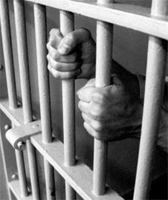Seyed Mohamad Hassan Razavi
2010 Asia JusticeMakers Fellow, Iran
 Hassan Razavi received a Bachelor’s and a Master’s degree in law from the University of Tehran. He then continued his studies toward PhD in Switzerland and in University of Neuchatel. He has practiced law as legal expert and a legal advisor for several business companies and public entities.
Hassan Razavi received a Bachelor’s and a Master’s degree in law from the University of Tehran. He then continued his studies toward PhD in Switzerland and in University of Neuchatel. He has practiced law as legal expert and a legal advisor for several business companies and public entities.
Hassan Razavi worked as a lawyer in Iran for two years, working closely with criminals and prisoners. Hassan has seen first-hand the problems and difficulties inmates have when they are separated from the rest of the world, This has inspired him to work on behalf of prisoners in Iran as a whole. He knows that incarceration can have a significant social impact, and that there is a common cycle of criminal behavior for children who grow up without a father or mother due to their incarceration.
The Problem
In Iran, 50,000 people enter prison every month, which amounts to 600,000 per year. According to Mr. Razavi, people are incarcerated too easily, whether it is short-term custody before trial or long-term custody after trial.
This is problematic for a few reasons. First, Iran is a traditional society in which, for the most part, it is men who work and support families. Thus, when men are incarcerated, their families suffer, particularly financially and often become isolated from the rest of society. In addition, incarceration does not often lead to rehabilitation. In fact, it can actually increase the rate of recidivism. A better approach is to maintain connections between the prisoner and his family, which leads to positive rehabilitative outcomes in many cases.
The Innovation
Mr. Razavi’s project aims to introduce alternative forms of social control in order to mitigate the social consequences and unintended impacts of incarceration on families. He wants to change the mentality of legal officials and judges by making them more responsible for their decisions regarding imprisonment. Introducing alternative approaches “would lead to a new paradigm against [the] massive use of prisons and would make the judges consider the social impacts of their decisions before they…imprison [people].”
Mr. Razavi believes that decarceration is a workable policy in Iran, and that it can help alleviate the problems of safety, poverty, and homelessness in a cost-effective and resource-friendly manner. In iran, as elsewhere, incarceration has not contributed to the solutions of such problems, and the costs in infrastructure and maintenance for the incarcerated has been huge, not to mention the costs borne by the families of the incarcerated.
Specifically, Mr. Razavi’s project includes the following:training workshops, round-tables, conferences and classes; the preparation and distribution of educational packages, advertising, and films, etc.; communicating and coordinating with the Department of Education to teach life skills courses in high school which will provide guidance on effective roles in society and the destructive effects on the family of prison culture; the development of legal alternatives to imprisonment; and reviewing and reforming the penal codes along with increasing public awareness.
(By mutual agreement, IBJ did not provide Mr. Razavi a stipend to finance his project.)